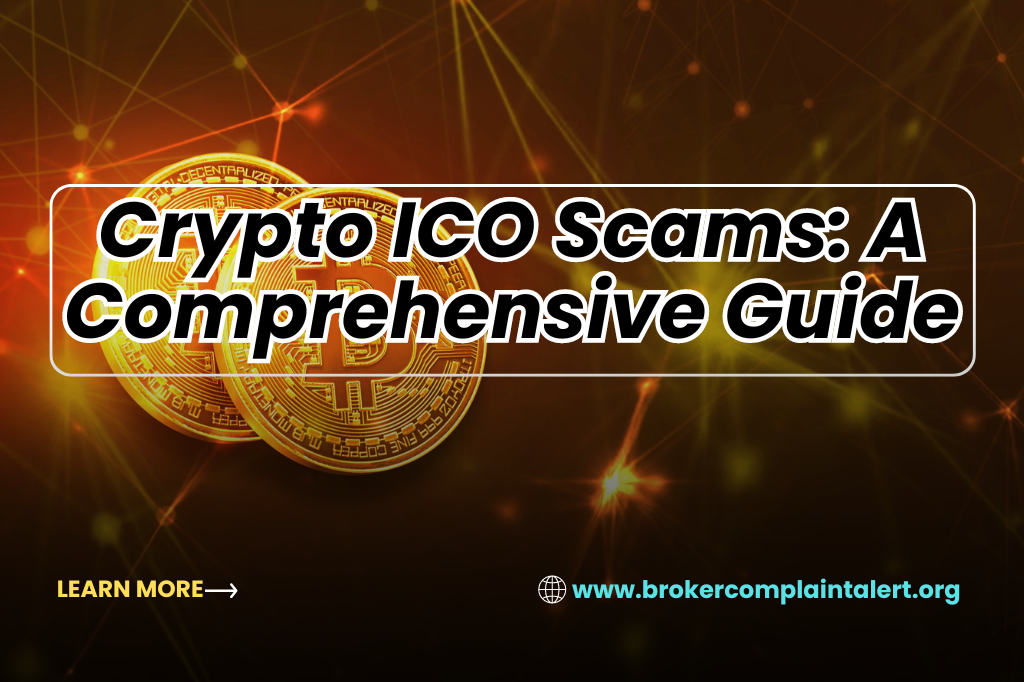Initial Coin Offerings (ICOs) have revolutionized the way startups and blockchain projects raise capital. By allowing companies to bypass traditional funding methods and directly engage with potential investors, ICOs have opened new avenues for innovation and growth.
However, this unregulated space also presents significant risks, particularly in the form of ICO scams. As the cryptocurrency market has matured, so too have the methods used by fraudsters to deceive and exploit investors.
Understanding the dynamics of ICO scams is crucial for anyone looking to participate in the crypto space. With the potential for significant financial loss, it’s important to recognize the warning signs and take steps to protect oneself.
This guide aims to provide a comprehensive overview of ICO scams, how they operate, and what investors can do to avoid falling victim.
What are ICO Scams?
ICO scams are fraudulent schemes designed to deceive investors by promising high returns on investments in non-existent or illegitimate cryptocurrency projects.
These scams often mimic legitimate ICOs, using sophisticated marketing tactics and polished websites to lure unsuspecting investors. The goal is to collect as much money as possible before disappearing, leaving investors with worthless tokens or no tokens at all.
Historically, ICO scams have plagued the cryptocurrency market, with some high-profile cases causing significant damage. For example, the 2017 Centra Tech ICO, which raised over $25 million, was later revealed to be a scam.
The founders were arrested, and investors were left with substantial losses. Such cases highlight the widespread impact of ICO scams on the crypto community, eroding trust and making it more challenging for legitimate projects to gain traction.
The damage caused by ICO scams extends beyond individual investors. They contribute to a broader environment of skepticism and regulatory scrutiny, which can stifle innovation in the cryptocurrency space.
As a result, understanding how these scams operate and recognizing the red flags is essential for anyone involved in the crypto market.
How do ICO Scams operate?
ICO scams typically employ a variety of strategies to deceive investors. One common tactic is the creation of fake whitepapers—documents that purport to outline the technical and business details of the project.
These whitepapers often contain impressive but meaningless jargon, designed to create the illusion of a legitimate and innovative project. However, upon closer inspection, these documents often lack substance and contain vague or unrealistic claims.
Another common strategy involves false team members and advisors. Scammers will often list fake or stolen identities on their websites, presenting them as the project’s leadership team or advisory board.
In some cases, they may even use the names and photos of real, reputable individuals without their knowledge. This tactic aims to lend credibility to the scam and convince investors that the project is backed by experienced professionals.
Pump and dump schemes are another prevalent method used by ICO scammers. In these cases, the scammers artificially inflate the value of their tokens by generating hype and encouraging rapid investment.
Once the token’s price reaches a peak, the scammers sell off their holdings, causing the value to plummet and leaving investors with worthless tokens. This type of scam is particularly damaging because it preys on the fear of missing out (FOMO) that drives many investors to make impulsive decisions.
To illustrate these tactics, consider the case of Bitconnect, one of the most notorious ICO scams in history. Bitconnect promised investors guaranteed returns through its lending platform, which was supposedly powered by a proprietary trading algorithm.
In reality, Bitconnect was a Ponzi scheme, and when it collapsed in early 2018, investors lost billions of dollars. The project’s leaders vanished, leaving behind a trail of financial ruin and shattered trust.
How to Identify and Avoid ICO Scams?
Recognizing the red flags of an ICO scam is essential for protecting oneself in the cryptocurrency market. One of the most obvious warning signs is unrealistic promises.
If an ICO guarantees high returns with little to no risk, it’s likely too good to be true. Legitimate projects will acknowledge the inherent risks of investing in cryptocurrencies and will not make promises they cannot keep.
Lack of transparency is another major red flag. A legitimate ICO should provide detailed information about its team, advisors, and business plan. If this information is vague or difficult to verify, it’s a strong indication that something is amiss.
Investors should take the time to research the project’s leadership, checking their credentials and past experience to ensure they are qualified to deliver on their promises.
Another tactic used by scammers is creating a sense of urgency by pressuring potential investors to act quickly. This may come in the form of limited-time offers or bonuses for early investors.
Pressure to invest quickly is a common sign of a scam, as it discourages investors from taking the time to conduct proper due diligence.
To avoid falling victim to an ICO scam, it’s important to conduct thorough research. Start by researching the team and advisors associated with the project. Verify their identities through LinkedIn, professional websites, and other social media platforms.
Look for evidence of their involvement in past successful projects or reputable companies.
Next, take the time to analyze the whitepaper. A legitimate whitepaper should provide a clear and detailed explanation of the project’s goals, technology, and business plan.
Look for specific milestones, timelines, and a well-thought-out use of funds. If the whitepaper is filled with buzzwords but lacks concrete details, it’s likely a red flag.
Finally, seek out community and expert opinions. Join online forums, such as Reddit or Bitcointalk, where you can engage with other investors and experts. Look for independent reviews and analyses of the ICO to get a better sense of its legitimacy.
Remember, the more information you can gather from trusted sources, the better equipped you’ll be to make an informed decision.
If you have lost money to companies like Finnaprotrade.com or Xccoins.com; please report it to us on our Report a Scam form.
Legal Recourse and Recovery Options
If you’ve fallen victim to an ICO scam, there are steps you can take to pursue legal recourse and recover your lost funds. The legal framework for crypto scams is still evolving, but many countries are beginning to implement regulations that protect investors and hold scammers accountable.
Depending on your jurisdiction, you may be able to file a complaint with a financial regulatory body or pursue a civil lawsuit against the scammers.
The first step in recovering from an ICO scam is to report the scam to the appropriate authorities.
This could include local law enforcement, financial regulators, or consumer protection agencies. Reporting the scam not only increases your chances of recovery but also helps prevent others from falling victim to the same scheme.
In some cases, victims of ICO scams have successfully recovered their funds through legal action.
For example, in 2018, the U.S. Securities and Exchange Commission (SEC) filed charges against the founders of the AriseBank ICO, which had raised over $600 million through fraudulent means. The SEC was able to freeze the company’s assets and return some of the funds to investors.
While legal recourse can be challenging and time-consuming, it’s important to take action if you’ve been scammed. Even if recovery is not guaranteed, holding scammers accountable can help deter future fraud and protect the broader cryptocurrency community.
Broker Complaint Alert: A Key Resource for Victims
For those who have fallen victim to an ICO scam, Broker Complaint Alert is a valuable resource. This organization offers free consultations to help victims assess their situation and explore potential recovery options. With a team of experts experienced in cryptocurrency recovery, Broker Complaint Alert provides professional guidance on the best course of action.
In addition to recovery services, Broker Complaint Alert offers educational blogs and materials designed to help investors stay informed about the latest scams and best practices for protecting their assets. By providing access to this wealth of information, Broker Complaint Alert empowers individuals to make smarter investment decisions and avoid falling victim to future scams.
The organization has a proven track record of helping victims recover their lost funds. Success stories include cases where individuals were able to regain a significant portion of their investments after working with Broker Complaint Alert. These stories serve as a testament to the importance of seeking help from experienced professionals when dealing with the aftermath of an ICO scam.
Final Thoughts
ICO scams represent a significant risk in the cryptocurrency market, but by staying informed and conducting thorough research, investors can protect themselves from these fraudulent schemes. The key is to remain vigilant, recognize the red flags, and seek help when needed.
If you suspect that you’ve been targeted by an ICO scam, it’s crucial to take immediate action. Reporting the scam to the authorities and seeking guidance from organizations like Broker Complaint Alert can increase your chances of recovery and help you navigate the complex world of cryptocurrency.
By staying informed and cautious, you can safely navigate the world of ICOs and contribute to a more secure and trustworthy cryptocurrency ecosystem.


